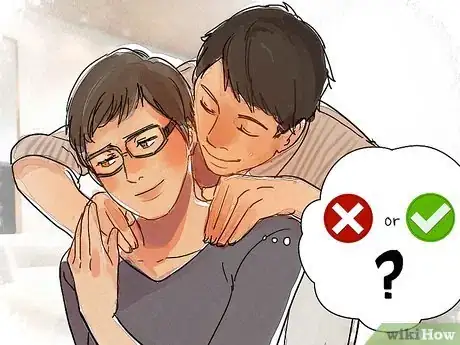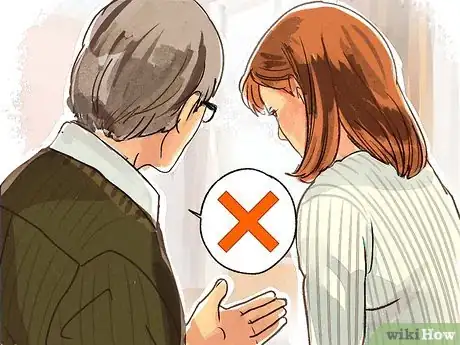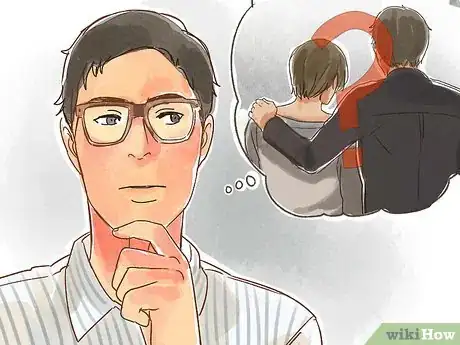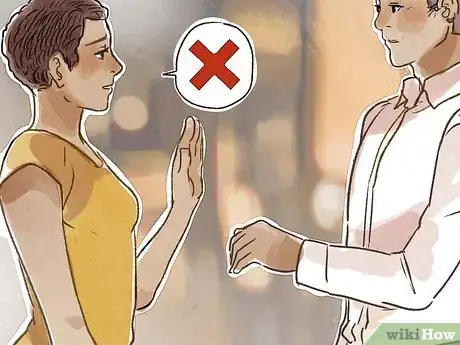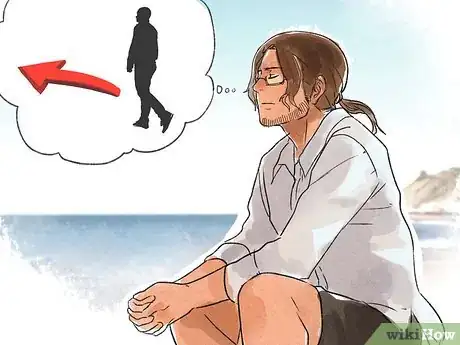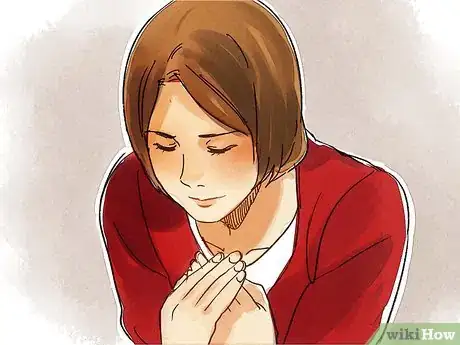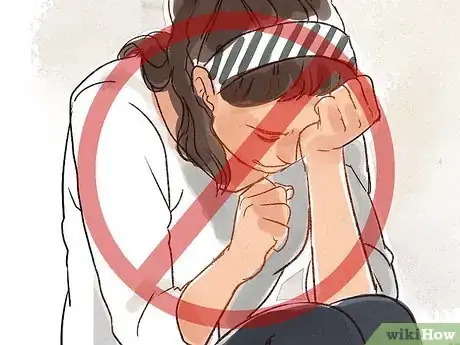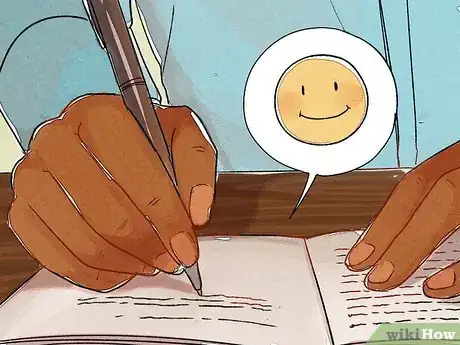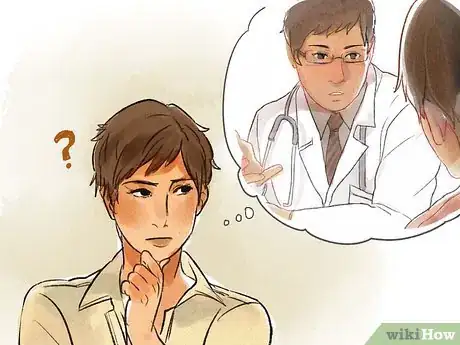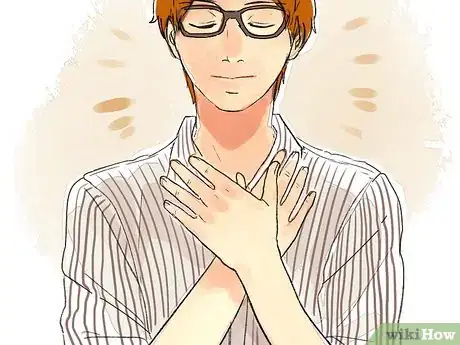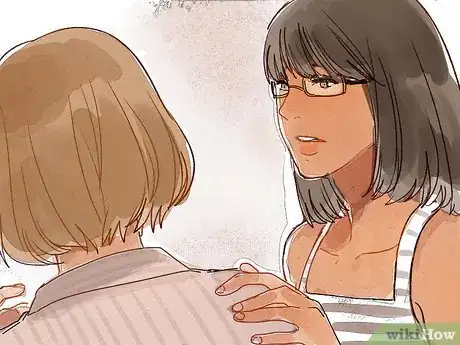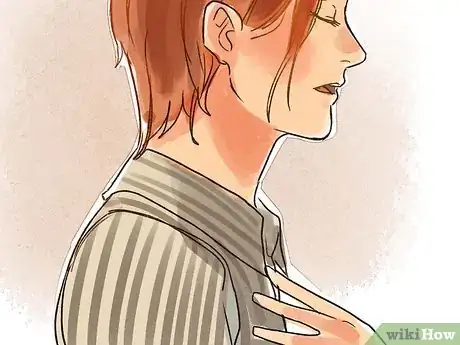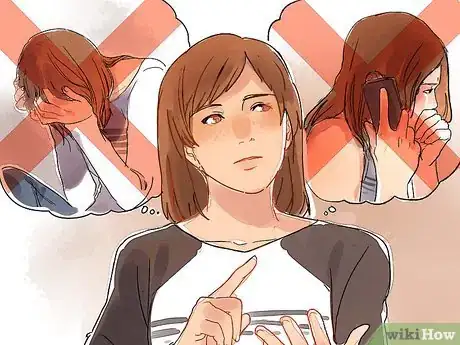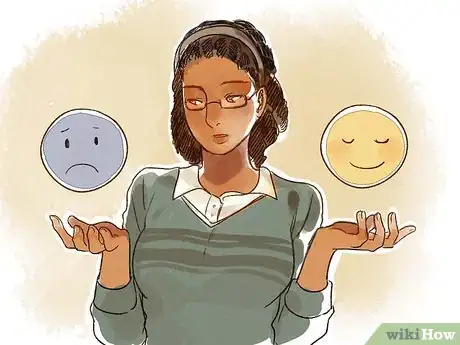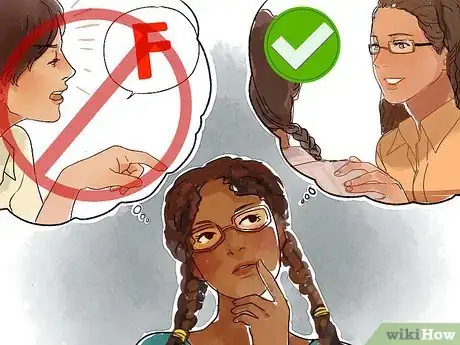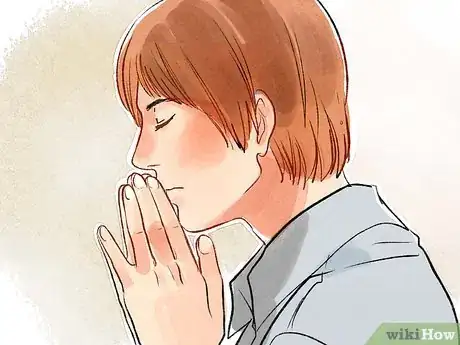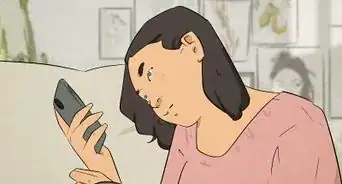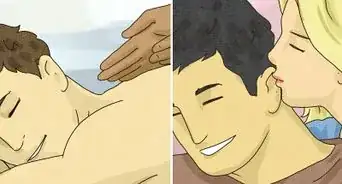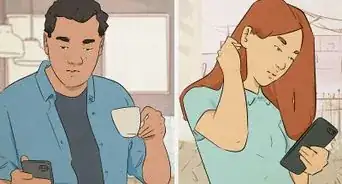This article was co-authored by Trudi Griffin, LPC, MS. Trudi Griffin is a Licensed Professional Counselor in Wisconsin specializing in Addictions and Mental Health. She provides therapy to people who struggle with addictions, mental health, and trauma in community health settings and private practice. She received her MS in Clinical Mental Health Counseling from Marquette University in 2011.
There are 13 references cited in this article, which can be found at the bottom of the page.
This article has been viewed 190,017 times.
When your love life is a one-way street, chances are you're in love with the wrong person at the wrong time. It’s easy to get stuck in self-pity and sadness. To make your life better, you'll need to get out of self-pity, and start to practice self-care skills. Avoid falling back into the same trap by taking practical steps to understand your attraction to the wrong person.
Steps
Assessing Your Situation
-
1Notice how you feel when you’re around him. No matter how sure you are that he’s the right one for you, if you have a nagging sense that something’s wrong, it might be. Not every love story is perfect, but the first step of a healthy relationship is honest evaluation.[1]
- If your relationship can’t stand up to deliberate scrutiny, you are hiding yourself from facing the truth about it.
- Talking to a friend may be helpful during this process. Many times, a friend will be able to help you see things about your relationship that you’ve avoided.
-
2Pay attention to what your friends and family think. If you notice that your family avoids talking about your beau, and your friends keep their distance, this is a sign that you’re in love with the wrong person. These are people who care about you, and about your well being. Talk to them about their concerns.[2]
- Try to listen without defending yourself or the person you’re in love with. It’s in your best interest to hear what they have to say, so keep quiet and listen while they talk to you.
- Your friends and family will have noticed if the person you love hasn’t been treating you with respect.
Advertisement -
3Try to visualize the future with the person. If you’re having trouble seeing what a realistic future would look like together, you probably already know that it’s time to move on. If you can’t realistically see your lives together in 5 or 10 years, it might be because you’re in love with the wrong person.[3]
- Some people can be very fun to be with in the moment, but that doesn’t mean that you’re obligated to stay with the person forever. Sometimes it’s just the wrong time for a long-term commitment.
- Another sign might be that you continually find yourself daydreaming about what your life might be like without the other person in it. In this case, it might be time to make that dream come true.
-
4Recognize the signs of rejection. Sometimes the person you love doesn’t love you back, and it’s up to you to accept this. It will be easier to accept when you realize that his lack of love has more to do with him and his life than it does with you. Maybe he’s become involved with drinking or drugs, or has problems with depression, or is upset or otherwise self-absorbed. Maybe he’s realized that he’s not in love with you, and there’s a chance he’s even told you this.
- If he’s consistently breaking his promises to you, not communicating his needs, and leaving you alone to wonder what you did wrong, these are all signs of rejection.
- Try to realize that if this is the case, there’s really nothing you can do about it.
Moving Beyond Self-Pity
-
1Start to accept the situation. If you allow yourself to focus on revenge, you'll be dragging around the pain of this situation for years to come. Instead, accept that pain is an inevitable consequence of your current situation.[4]
- As you move forward, you'll be able to learn from your experience, and grow as a person.
- Work towards feeling compassion toward the person who's disappointed you. Though you may not understand the other person's decisions, you can try to accept them.
-
2Remind yourself of your own value. If it helps, use daily affirmations, or post reminders in areas you're likely to see them. Just because you've been in love with the wrong person, or have been frustrated because it's the wrong time to develop a relationship, doesn't mean that you don't have value. Remember, your life is made up of a series of experiences and encounters, not just this one.[5]
- You are exactly the right person at the right time, for someone else.
- You may find that you're able to use this experience in rejection as a lesson in finding the right person for you.
-
3Quit feeling sorry for yourself. When you’re in love with the wrong person, it’s easy to feel sorry for yourself. It’s a sad situation, and feelings of self-pity can provide a temporary solace. The first step is to decide that you’re going to implement a zero tolerance policy towards self-pity in your life.[6]
- If you notice feelings of self-pity creeping in, remind yourself of something that you feel good about.
- You’ll probably slip into self-pity as you try to quit, because of ingrained patterns of thinking. Don’t get angry at yourself; just notice when this happens, and turn your attention to something more positive.
- When you start to realize that self-pity isn’t a solution to your problem, you’re ready to try new things.
-
4Keep a gratitude journal. Forcing yourself to pay attention to the good things in your life which you might otherwise take for granted will help you counter your feelings of sadness. The best practices in keeping a gratitude journal include writing in detail about particular people you’re grateful for, and recording events which were surprising or unexpected.[7]
- Write without worrying about the quality of your writing in a gratitude journal. You can write in complete sentences, or you can just jot down a couple of words, ideas, or images.
- When you’re feeling overwhelmed by negative feelings, writing a list of things that you’re grateful for can help turn your attention to more positive things.
- You can read through your gratitude journal to give yourself a boost any time. After all, no matter how hard your life might feel at the moment, there are always things to be happy about.
Practicing Self-Care Skills
-
1Consider talking to a professional. A therapist, counselor, rabbi, minister or another professional will have had experience in helping people cope with unhappy experiences of love. It can be helpful to talk to someone who doesn’t have a personal investment in the situation, who can talk to you without being concerned about taking sides. Self-pity can be due to a long history of bad relationships, starting from childhood. You may need to work through these issues to start improving your relationships. You should not attempt to do this on your own. Seek help from a mental health professional who can guide you through this process.[8]
- You may want to check with the therapist to see if examining your past relationships is something that he or she can help you to do. Some therapists prefer to focus on the present rather than digging up problems from your past.
- Keep in mind that this process can be quite painful and it will take time to complete.
- You can trust a professional not to share your personal information with others.
- Seeing a professional can be expensive, but often insurance coverage can help defray the costs. There are also clinics which offer counseling services for free or lower-cost for low income people.
-
2Learn to love yourself. When you've been involved in an unhappy love situation, you might conclude that no one wants you. However, this is a result of rejection and/or being in a bad relationship. Instead, take this opportunity to remind yourself of your positive qualities.[9]
- Practicing self-love will aid the healing process of a broken heart, as it affirms your self-worth and self-esteem.
- If you find yourself engaging in negative self-talk, check yourself. Are these words that you would say to a loved one? If not, consider what you might say to someone whom you loved.
-
3Talk to someone you trust. There are lots of good reasons to share your feelings with another person. Talking about your frustration will help you see your relationship in a new way, which may offer solutions you hadn’t thought about before.[10]
- Talking with a trusted friend is a great way to release pent-up feelings, and will help you feel better.
- You’ll likely find out that your friend has had similar experiences, which will help if you’re feeling alone.
-
4Start to build your self-esteem. Low self-esteem is an unrealistically negative evaluation of yourself. People with low self-esteem are more likely to find themselves in unhappy love situations. As you develop your ability to care about yourself, you’ll be less likely to feel sorry for yourself.[11]
- Perhaps this is a good time to try new activities, join self-help groups, or volunteer to help someone less fortunate than yourself.
- Paying attention to your own feelings can help you develop self-esteem. When you don’t respect your own feelings, you’re left to believe whatever other people tell you you should feel.
-
5Get active. Moving your body is an excellent way to stop feeling sorry for yourself. When you force yourself to exercise and get your heart pumping, you’ll start to feel better about yourself. The endorphins that come from exercise will kick in, elevating your mood.
- Remember the old expression, “Move a muscle, change a thought.”
- Exercise helps everything about your life: you’ll sleep better, you’ll become healthier and more fit, and you’ll feel less stressed.
-
6Practice kindness to yourself. When you notice your internal dialogue (or self-talk) repeating negativity, find a way to see things in a new light. For example, if you find yourself telling yourself, “You’re so stupid!” remind yourself that, “That’s okay, it was just a little mistake.” If it was a big mistake, remind yourself that you’ll learn from the experience. You can say, “It’s human to make mistakes. I love myself anyway, and I don’t have to be perfect.”[12]
- Being understanding towards yourself when you make a mistake will help you heal as you cope with unreturned feelings of love.
- When you’re in love with the wrong person, it’s especially important to practice kindness to yourself.
-
7Live intentionally. This means prioritizing what you want, feel and think. People who fall in love with the wrong person often have spent more time relying on what other people want for them, rather than on what they want for themselves. If you’re trying to cope with an unhappy experience of love, restore your balance by paying attention to yourself.[13]
- Consider what really makes you feel happy. When do you feel most “like yourself”? Do more of these things.[14]
- When you find yourself doing things that make you feel awkward, silly, or unimportant, it’s okay to try to minimize these things in your life.
Understanding Your Feelings
-
1Accept responsibility for your choices. Even though it might not feel very good, making the decision to take responsibility for the decisions you’ve made will help you learn and grow. After all, to be responsible for your choices is the opposite of being a victim; a victim is a powerless role. To be in charge of your own life is powerful.[15]
- By taking responsibility, you’ll be in a better position to learn from your choices.
- Even when someone else has acted badly, it’s likely that you had a part to play.
- Talking with a therapist, a counselor, or a trusted friend can help you sort through your choices in a new way.
-
2Look for patterns in your love life. If you feel insecure in relationships or don’t like to get too close to people, chances are you’ve been in multiple unhappy love situations. A good friend or a therapist can be a great resource in identifying patterns that cause you to seek out bad relationships.[16]
- Try reading up on attachment issues to see if you’re able to identify your own experiences.
- Seeing your behavior as a series of patterns, rather than moral failures, can help provide a nonjudgmental lens.[17]
-
3Examine your feelings about being single. There is a lot of myth-based stigma around being single. Fears about being single can skew your priorities, allowing you to get in (and stay in!) unsatisfying relationships.[18]
- People who are in bad relationships are just as lonely as people who are afraid of being single.
- If you’re afraid of being single, you’re more likely to miss warning signs that would keep you from being in a bad relationship.
-
4Protect yourself. Make sure you’re practicing discernment when you choose who to let into your life. If you notice friends who appear to take pleasure in your discomfort or misfortune, you might want to consider keeping them out of your life.[19]
- Cultivate friendships that help you feel nourished and protected. Your friends should be happy when things are going well for you.
- When you’re surrounded by people who love and respect you, you’re more likely to be able to love and respect yourself.
-
5Forgive yourself for past mistakes. If you’ve made a mistake by loving someone who’s not available to love you back, you’re only human. Being less hard on yourself may take some practice, but ultimately learning to forgive yourself will lead you to a more resilient life.[20]
- Mistakes are only mistakes, and opportunities abound to learn from them. Consider mistakes lessons that you needed to learn.
- Without pain, there’s little chance of growing and learning new things. Mistakes, even painful ones, are just a part of learning.
Warnings
- Don’t keep your feelings to yourself. Finding a way to share your feelings with others is important to your own mental health.⧼thumbs_response⧽
- Don’t expect the other person to change.⧼thumbs_response⧽
References
- ↑ http://hellogiggles.com/relationships-wrong-person/
- ↑ http://hellogiggles.com/relationships-wrong-person/
- ↑ http://hellogiggles.com/relationships-wrong-person/
- ↑ http://www.singleparents.org.uk/your-space/relationships/how-to-recover-from-a-broken-heart
- ↑ http://www.singleparents.org.uk/your-space/relationships/how-to-recover-from-a-broken-heart
- ↑ http://www.cleanandsoberlive.com/how-to-stop-feeling-sorry-for-yourself/
- ↑ http://greatergood.berkeley.edu/article/item/tips_for_keeping_a_gratitude_journal
- ↑ https://www.betterhealth.vic.gov.au/health/healthyliving/talking-through-problems
- ↑ http://www.singleparents.org.uk/your-space/relationships/how-to-recover-from-a-broken-heart
- ↑ https://www.betterhealth.vic.gov.au/health/healthyliving/talking-through-problems
- ↑ http://psychcentral.com/lib/how-to-raise-your-self-esteem/
- ↑ http://psychcentral.com/blog/archives/2013/10/17/3-ways-to-develop-self-trust/
- ↑ https://www.psychologytoday.com/blog/get-hardy/201203/seven-step-prescription-self-love
- ↑ http://gailbrenner.com/2011/04/happiness-alert-you-need-to-pay-attention/
- ↑ http://www.emotionalcompetency.com/responsibility.htm
- ↑ http://greatergood.berkeley.edu/article/item/how_to_stop_attachment_insecurity_from_ruining_your_love_life
- ↑ http://tinybuddha.com/blog/recognizing-our-patterns-and-learning-how-to-change-them/
- ↑ http://greatergood.berkeley.edu/article/item/four_reasons_to_stay_single
- ↑ https://www.psychologytoday.com/blog/get-hardy/201203/seven-step-prescription-self-love
- ↑ https://www.psychologytoday.com/blog/get-hardy/201203/seven-step-prescription-self-love
About This Article
Loving the wrong person at the wrong time can be painful, but by focusing on your own life, you can start to move on. If you find yourself feeling down or worthless, try reminding yourself of your best qualities. Remember that no one else determines your value and you don’t need anyone else to be happy. Distract yourself with the hobbies and interests you love. Exercise can also be a great way to take your mind off it and help you feel good about yourself. If you can’t stop thinking about the person, try talking to a friend or family member you trust about it. Or, write your feelings down in a journal to help get them out of your head. For more tips from our co-author, including how to avoid falling for the wrong person in the future, read on.
